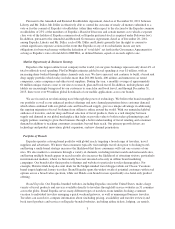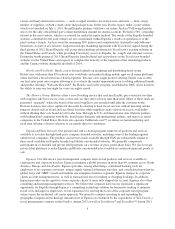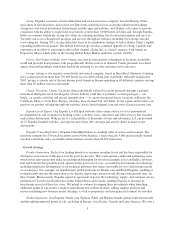Expedia 2013 Annual Report Download - page 19
Download and view the complete annual report
Please find page 19 of the 2013 Expedia annual report below. You can navigate through the pages in the report by either clicking on the pages listed below, or by using the keyword search tool below to find specific information within the annual report.non-payments of amounts owed to us from our supplier partners and customers, as well as limiting our ability to
develop new site innovations. These new initiatives may therefore not be successful and may harm our financial
condition and operating results.
For example, during 2012, Expedia introduced the ETP program to hotel suppliers in the United States and
Europe and is now in the process of rolling the program out globally. ETP offers travelers the choice of whether
to pay Expedia at the time of booking or pay the hotel at the time of stay. As part of the introduction of ETP, we
reduced negotiated economics in certain instances to compensate for hotel supply partners absorbing expenses
such as credit card fees and customer service costs. Therefore, the global rollout of ETP has begun to negatively
impact the margin of revenue we earn per booking and will continue to do so in the future. In addition, as we
continue to expand the breadth and depth of our global hotel offering and continue to roll out ETP, we have made
and expect to continue to make adjustments to our economics in various geographies including changes based on
local market conditions, each of which may also negatively impact the margin of revenue we earn per booking in
the future. Depending on relative supplier and traveler adoption rates and customer payment preferences, among
other things, the introduction of ETP could also negatively impact our near term working capital cash balances,
cash flow over time and liquidity.
Our business could be negatively affected by changes in search engine algorithms and dynamics or
other traffic-generating arrangements.
We increasingly utilize internet search engines such as Google, principally through the purchase of travel-
related keywords, to generate traffic to our websites. Search engines, including Google, frequently update and
change the logic that determines the placement and display of results of a user’s search, such that the purchased
or algorithmic placement of links to our websites can be negatively affected. In addition, a significant amount of
traffic is directed to our websites through our participation in pay-per-click and display advertising campaigns on
search engines, including Google, travel metasearch engines, including Kayak, and internet media properties,
including TripAdvisor. Pricing and operating dynamics for these traffic sources can experience rapid change,
both technically and competitively. Moreover, a search or metasearch engine could, for competitive or other
purposes, alter its search algorithms or results causing a website to place lower in search query results. If a major
search engine changes its algorithms or results in a manner that negatively affects the search engine ranking, paid
or unpaid, of our websites or that of our third-party distribution partners, or if competitive dynamics impact the
costs or effectiveness of search engine optimization, search engine marketing or other traffic-generating
arrangements in a negative manner, our business and financial performance would be adversely affected,
potentially to a material extent.
Declines or disruptions in the travel industry could adversely affect our business and financial
performance.
Our business and financial performance are affected by the health of the worldwide travel industry. Travel
expenditures are sensitive to personal and business-related discretionary spending levels and tend to decline or
grow more slowly during economic downturns. Decreased travel expenditures could reduce the demand for our
services, thereby causing a reduction in revenue.
For example, beginning in 2008, domestic and global economic conditions deteriorated rapidly resulting in
increased unemployment and a reduction in available budgets for both business and leisure travelers, which
slowed spending on the services we provide and had a negative impact on our revenue growth. More recently,
during 2012, several Eurozone countries experienced deteriorating credit and economic conditions, which and
also resulted in significant devaluation of the Euro relative to other currencies such as the U.S. dollar, which in
turn had a negative impact on our Euro-denominated net assets, gross bookings, revenues, operating expenses,
and net income as expressed in U.S. dollars. Further economic weakness and uncertainty may result in
significantly decreased spending on our services by both business and leisure travelers, which may have a
material adverse impact on our business and financial performance. Current sovereign debt and economic issues
13
























